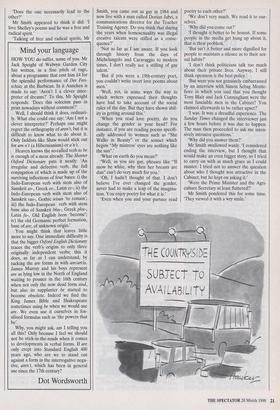Mind your language
HOW YOU do suffer, some of you. Mr Jack Speight of Welwyn Garden City has written, in a fine pitch of rage, about a programme that cost him £4 for the splendid performance of Der Frei- schiitz at the Barbican. In it Annchen is made to say: 'Aren't I a clever inter- preter of dreams?' To this, Mr Speight responds: 'Does this solecism pass in print nowadays without comment?' Well, I should think it does, ordinari- ly. What else could one say: 'Am I not a clever interpreter?' Perhaps one might regret the orthography of aren't, but it is difficult to know what to do about it. Only faddists like Shaw would stick out for am n't (a Hibernianism) or a'n't. Heaven knows the so-called verb to be is enough of a mess already. The Shorter Oxford Dictionary puts it neatly: 'An irregular and defective verb, the full conjugation of which is made up of the surviving inflections of four bases: i) the Indo-European verb with stem also of Sanskrit as-, Greek es-, Latin es-; ii) the Indo-European verb with stem also of Sanskrit vas-, Gothic wisan `to remain'; iii) the Indo-European verb with stem base also of Sanskrit bhu-, Greek phu-, Latin fu-, Old English beon 'become'; iv) the old Germanic perfect formation, base of are, of unknown origin.'
You might think that leaves little more to say. One immediate difficulty is that the bigger Oxford English Dictionary traces the verb's origins to only three originally independent verbs; this it does, as far as I can understand, by tucking the are forms in with am/art/is. James Murray and his boys represent are as lying low in the North of England waiting to pounce in the 16th century when not only the now dead form sind, but also its supplanter be started to become obsolete. Indeed we find the King James Bible and Shakespeare sometimes using be when we would use are. We even use it ourselves in fos- silised formulas such as 'the powers that be'.
Why, you might ask, am I telling you all this? Only because I feel we should not be stick-in-the-muds when it comes to developments in verbal forms. If are only crept into Standard English 400 years ago, who are we to stand out against a form in the interrogative nega- tive, aren't, which has been in general use since the 17th century?
Dot Wordsworth






















































 Previous page
Previous page